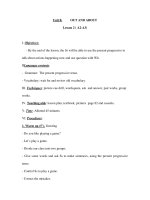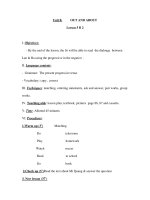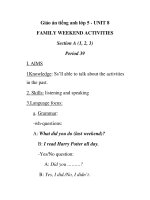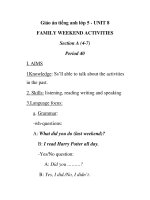Giáo án Tiếng Anh lớp 9 Unit 8 Celebrations
Bạn đang xem bản rút gọn của tài liệu. Xem và tải ngay bản đầy đủ của tài liệu tại đây (205.2 KB, 12 trang )
Lesson Plan - English 9.
112
Period 49. Unit 8: celebrations
Lesson 1: getting started - listen and read. P.65 - 66
I. Aims:
- To introduce some festivals in the world to the students.
- To teach students the relative pronouns WHO and WHICH used in the relative clauses.
II. Objectives:
- By the end of the lesson, students will be able to know more about the popular celebrations
in the world and recognize the relative clauses in the text.
III. Ways of working:
T - WC, teamwork, individual work.
IV. Materials: Textbook, pictures in the textbook, tape and cassette player.
V. Anticipated problems: The lesson may take time.
VI. Teaching steps:
1. Warm up: (1 minute) Greet and check the students' attendance.
2. Revision: (5 minutes) Shark attack: CELEBRATION
3. New lesson:
STAGES ACTIVITIES ON BOARD
PRE
READING
(12
minutes)
* Getting started: Matching
- Students match the icons with
the names of the celebrations
they present
I. Matching:
Easter
Lunar New Year
Christmas
Birthday
Mid-Fall Festival
Wedding
1 2 3
4 5 6
Answer key:
Lesson Plan - English 9.
113
- Teacher gets students to add
more the list of the celebrations.
* Preteach vocabulary:
- Teacher uses techniques to
teach students new words.
- Checking understanding:
Rubout and remember
* Open Prediction:
- Teacher gets students to predict
the three celebrations from the
text.
1- Easter
2- Wedding
3- Birthay
4- Christmas
5- Mid-Fall Festival
6- Lunnar New Year
II. New words:
- (to) occur = (to) happen
- (to) decorate: trang trÝ
- slavery: sù n« lÖ
- parade: cuéc diÔu hµnh, ®¸m ríc
III. Prediction: Three celebrations from the text:
E.g:
1- Christmas
WHILE
READING
(17
minutes)
* Listen and read. P.65 - 66:
- Students read the text for the
first time and check their
predictions:
- Students read the text for the
second time and match the
English words and phrases with
their Vietnamese meanings:
- Students read the text for the
third time and complete the
table:
IV. Listen and read. P.65 - 66:
1. Checking predictions:
* Answer Key:
1- Tet or the Lunar New Year holiday
2- Passover
3- Easter
2. Matching:
(to) live apart
Passover
Jewish people
freedom
(to) crowd
ngêi Do Th¸i
tô tËp
sèng xa nhau / nhµ
LÔ Qu¸ H¶i
sù tù do
3. Complete the table:
Celebration When Activities Food Country
Tet
in late
January
or early
February
cleaning
and
decorating
homes,
enjoying
special
food
sticky
rice
cakes
Viet
Nam
Passover
late
March
or early
April
(not
available)
special
meal
called
the Seder
Israel
Easter
around
the same
time as
Passover
People
crowd the
streets to
watch
colorful
parades
chocolate
or sugar
eggs
in many
countries
POST
* Retell story: 4. Retell story:
Lesson Plan - English 9.
114
READING
(8
minutes)
- Students retell the three
celebrations mentioned basing
on the grid.
- Teacher asks students to find
the sentences in the text in which
WHO and WHICH are used.
- T. asks students to translate
them into Vietnamese.
5. Model sentences:
- Family members who live apart try to be
together at Tet.
- Tet is a festival which occurs in late January or
early February.
- Easter is a joyful festival which is celebrateed in
many countries.
4. Homework:
(2 minutes)
- Learn by heart all the new words and read the text again.
- Do exercises: 1, 3. P.52 - 53 (Workbook)
* Teacher guides students to do the exercises: Bt 1: Điền who / whom / which / where vào
chỗ trống.
BT 3: Đọc đoạn văn sau đó điền who / which / where vào chỗ trống.
Period 50. Unit 8: celebrations
Lesson 2: speak - listen
I. Aims:
- To help students give and respond t complements.
- To help students listen to a song and fill in the missing words.
- To teach students how to sing the song
"Auld Lang Syne".
- To develop students' skills.
II. Objectives: By the end of the lesson, students will be able to give and respond to
compliments. Students will also be able to sing the song:
"Auld Lang Syne".
III. Ways of working: T - WC, team work, individual work.
IV. Materials:
Textbook, tape, additional board.
V. Anticipated problems:
- The lesson may take time.
Lesson Plan - English 9.
115
- Listening and singing the song may difficult for some students.
VI. Teaching steps:
1. Warm up: (1 minute) Greet and check the students' attendance.
2. Revision:
(5 minutes)
Wordsquare:
Students find the adjectives in the wordsquare.
e b e a u t
x k i n d i
c g o o d f
e c i n o u
l l e w t l
l e n t a b
* Answer key:
excellent
beautiful
kind, good
nice, well
3. New lesson:
STAGES ACTIVITIES ON BOARD
PRE
SPEAKING
(6
minutes)
* Preteach vocabulary:
- Teacher uses techniques to teach
students new words
- Checking understanding:
Rubout and remember.
* Presentation:
- Set the scene:
Trang has just won the first prize in
the English speaking contest. May is
saying to pay Trang a complement and
Trang thanhs Mai.
Mai: Well done, Trang
Trang: Thanhs.
- Presentation expression: to give and
responding to complements.
A. SPEAK. P.65 - 66:
I. New words:
- active (adj): tÝch cùc
- (to) nominate: ghi danh, mÖnh danh,
chän
- charity program: ch¬ng tr×nh tõ thiÖn
II. Expressions:
* To give a complement
- Well done.
- That's a great/ an excellent
- Let me congratulate you on
- Congratulations on
* Responding to a complement:
- Thanks
- It's nice of you to say so.
- That's very kind of you.
WHILE
SPEAKING
(6
minutes)
* Speak. P.66 - 67:
- In pairs, students read the situations
given and then respond to appropriate
compliments.
III. Speak. P.65 - 66:
*Answer key:
a) Mai: Well done, Trang.
Trang: Thanks.
b) Mother: Well done, Huyen.
Lesson Plan - English 9.
116
Huyen:Thanhks, Mom.
c) Friends: Congratulations on your
nomination, Tuan.
Tuan: It's nice of you to sau so.
d) You: That's an excellent drawing, Hoa.
Hoa: That's very kind of you to say so.
POST
SPEAKING:
(4
minutes)
* Pair work:
- Students thinhk of situations in which
they can compliment their friends and
get responses from them, then to make
up dialogues.
* Situation:
Tam has just passed the final examination.
Friends: Congratulatons!
Tam: Thanks a lot.
PRE
LISTENING:
(10
minutes)
* Brainstorming:
- Students write the celebrations they
know: ( Eater, Christmas, Lunar New
Year, Birthday, Teacher's fay,
Thanksgiving (Day), Hallowe'en,
Passover, Women's Day, Mid-Fall
Festival, Wedding )
* Set the scene:
T: Do you know the folksong, always
sung at New Year in English-speaking
countries?
* Preteach:
- T. uses techniques to teach students
new words:
- Checking understanding:
Wordsquare:
acquaintance
day, long, mind
since, hand, thine
take
kind
* Open prediction:
- Students guess the missing words to
fill in the blanks.
B. LISTEN. P.68
* Brainstorming:
Eater
Lunar New
Year
Wedding
Mid-Fall
Festival
celebrations
Christmas
I. New words:
- Auld Lang Syne = the good old days
(In Scots: Auld = old: lang = long; syne =
since)
- acquaintance (n): ngêi quen biÕt
(to) bring to mind: nhí tíi
- thrine (pro) = yours (old use)
a
l
o
n
g
a
t
c
m
i
n
d
k
h
q
h
a
a
i
s
i
u
a
t
b
b
i
n
a
n
d
y
y
n
e
i
d
a
k
k
c
o
n
t
a
n
c
e
a
II. Prediction:
a) ; b) ; c) ; d) ; e)
WHILE
LISTENING
(6
minutes)
* Listen. P.68:
- Students listen for the first time and
check their predictions.
- Students listen again and fill in the
missing words.
III. Listen. P.69:
1. Checking predictions:
* Key:
a) days b) take
c) mind d) hand
Passover
Lesson Plan - English 9.
117
- Students listen for the third time and
then sing after the voice of the tape.
e) kindness
POST
LISTENING
(5 mintes)
* Singing. Part 4. P.68:
- Students sing the song Auld Lang
Syne.
4. Homework: (2 minutes)
- Learn by heart all the new words and expressions to give and respond to complements.
- Do exercises: 4, 5. P.55, 57 (workbook)
* Teacher guides students to do the exercises:
Bài tập 4: Viết câu, dùng từ, cụm từ cho dới các bức tranh với though, although, even
though.
Chú ý: Though, although, even though: mặc dù + clause. (Mệnh đề trang ngữ chỉ sự nhợng
bộ, mệnh đề này có thể ở đầu câu hoặc cuối câu)
Bài tập 5: Hoàn thành câu bằng cách viết nốt mệnh đề còn lại.
Period 51. Unit 8: celebrations
Lesson 3: read. P.68 - 69
I. Aims:
To help students read a text about children' emotion on Father' Day for details.
- To develop students' skills.
II. Objectives: By the end of the lesson, students will be able to understand the text for
details.
III. Ways of working: T - WC, team work, individual work.
IV. Materials: Textbook, pictures in the textbook, cards.
V. Anticipated problems:
The activity "writing" may be difficult for some students.
VI. Teaching steps:
1. Warm up: (1 minute) Greet and check the students' attendance.
Lesson Plan - English 9.
118
2. Revision: (7 minutes) * Pelmanism: (with answer key)
Women's
Day
Christmas
Day
Teacher' Day Children'
Day
8/3 25/2
20/11 1/6 May Day 2/9 Vietnamese
Independence
1/5
3. New lesson:
STAGES ACTIVITIES ON BOARD
PRE
READING
(12
minutes)
* Preteach vocabulary:
- Teacher uses techniques to teach
students new words.
- Checking understanding:
Rubout and remember.
* Set the scene:
There are many occasions or you to
express your feelings to others. You are
going to read the three paragraphs of
opinions, feelings and memories of
children about their father on Father's
Day in Australia and the USA.
* Prequestion:
I. New words:
- hug (n): sù «m chÆt
- considerate (adj): ©n cÇn, chu ®¸o
- generous (adj): réng lîng
- priority (n): sù u tiªn, quyÒn u tiªn
- sense of humor: khiÕu hµi híc
- terrific (adj): tuyÖt vêi
II.Predict the answer to the question:
- What are the fathers mentioned like?
E.g: generous. strong,
WHILE
READING
(15
minutes)
* Read. P.68 - 69:
- Students read for the first time and
check their predictions.
- Students read for the second time and
then answer the comprehension
questions.
III. Read. P.68 - 69:
1. Checking the predictions:
generous. considerate, humorous, great,
the best, terrific.
2. Answer the questions. P.69:
* Answer key:
a) To her dad.
b) He is possibly dead. These ideas may
tell about that: " how much you are
missed , I now have
children, Dad "
c) His sense of humor.
d) A father as a teacher, a caretaker, a
friend,
POST
LISTENING
(8
minutes)
* Write it up:
- Students write their feelings, opinions
and memories about their fathers.
IV. Write:
4. Homework: (2 minutes)
- Learn by heart all the new words and read the text again.
Lesson Plan - English 9.
119
- Do exercise: 2. P.52 - 53 (workbook).
* Teacher guides students to do the exercise:
Bài tập 2: Hoàn thành câu bằng cách chọn phần kết thích hợp nhất cho trong khung và viết
nó thành mệnh đề quan hệ.
Period 52. Unit 8: celebrations
Lesson 4: write. P.70
I. Aims: - To help students write a leter to their pen pal.
- To develop students' writing skill.
II. Objectives:
By the end of the lesson, students will be able to write a letter to share the
idea why it is necessary to have a day to celebrate for Mom and for Dad.
III. Ways of working: T - WC, individual work.
IV. Materials: Textbook, posters.
V. Anticipated problems:
VI. Teaching steps:
1. Warm up: (1 minute) Greet and check the students' attendance.
2. Revision: (5 minutes) Students do the exercise 2. P.52 - 53 (workbook)
3. New lesson:
STAGES ACTIVITIES ON BOARD
PRE
WRITING
(9
minutes)
* Preteach vocabulary:
- Teacher uses techniques to teach
students new words.
- Checking understaning:
Rubout and remember
* Discussion:
- In group, students discuss the
question "Why should we have a day
to celebrate for Mom and another for
Dad?"
I. New words:
- (to) enhance: tăng cờng, tôn lên
- (to) support: ủng hộ, hỗ trợ
- nationwide (adv): cả nớc, toàn quốc
Lesson Plan - English 9.
120
WHILE
WRITING
(17
minutes)
* Write. P.70:
- Question - Answer:
- Individually, students write a letter to
his / her friend to share the idea: "It is
necessary to have a day to celebrate for
Mom and another for Dad?"
For example:
In my opinion, it is necessary to have
a day to celebrate for our parents.
On these occasions, children will have
a special day to express their feelings,
memories and love for their parents.
We have an opportunity to enhance
family traditions. Members of families
can have a chance to get together, to
know another and to help one another.
- I think first Sunday of April is
suitable, Sunday is a day off so
everybody is free from work or studey.
April is in late Spring or early Summer,
and the weather is generally fine at
this time of the year, many activities
can happen outdoors.
- It is not necessary to have parties but
it is a good idea to have lunch or
dinner with all members of family.
Children should give their parents
flowers, send them cards or bring them
a special cake. Children should serve
their parents the food that they like
best.
- I believe the idea will be supported
and the day will be celebrated
nationwide because everybody loves
their parents and wants their parents to
be happy.
II. Answer these questions:
1. Why should we celebrate this day?
2. When to celebrate?
3. How to celebrate?
4. What special gifts to give?
5. What special food to offer?
6. Do you think your idea will be celebrated
nationwide?
III. Write:
Example:
Dear Minh,
This morning I just learned a lesson about
Father's Day. It was really intersting. In
Vietnam, however, people do not celebrate
Mother
s' Day or Farther s'Day. In my opinion, it s'
nesessary/ impotant/essential to have a day
to celebrate for Mom and another day for
Dad.
There are lots of reasons for celebrating
these days,but the main
reasons are the children will have a special
day to express their fellings, their memories
and their love to their parents. In addition,
we 'll have an oportunity to enhance family
traditions as well as a chance to get all
members of families together in order to
bring them closer.
I thing Sunday is the most suitable day for
celebrating because it's a day of so
everybody is free from work or study.
It's not necessery to have parties, but it's a
good idea to have lunch or
dinner with all family members. In
this special day, children should serve their
parents (with) the food they like best and
offer them flowers, cakes or special gifts
and cards.
What do you thing about my idea, Minh? I
believe it will be suppoted
and the day for our parents will be
celebrated nationwide someday.
Your,
Thanh.
POST
WRITNG
(10
* Correction:
- Students exchange their writng and
Lesson Plan - English 9.
121
minutes) correct their partner’s work.
- Teacher corrects some students’
works.
4. Homework:
(2 minutes)
- Learn by heart all the new words.
- Do exercise: Write a letter to your friend, telling who in your faminly you love most.
Period 53. Unit 8: celebrations
Lesson 5: language focus 1 – 4. P.70 – 73
I. Aims: To help students know how to use the relative clause and adverb clause of
concession.
- To develop students’ skills.
II. Objectives:
By the end of the lesson, students will be able to use relative clauses and
adverb clauses of concession.
III. Ways of working:
T – WC, pair work, individual work.
IV. Materials:
textbook, pictures in the textbook, color chalk.
V. Anticipated roblems: The lesson may take time.
VI. Teaching steps:
1. Warm up: (1 minute) Greet and check the students’ attendance.
2. Revision:
3. New lesson:
STAGES ACTIVITIES ON BOARD
PRESEN
TATION
(8
minutes)
* Relative clauses with relative
pronoun WHICH:
- Presentation dialogue:
- T. explain:
+ “which occurs in late January or
early February” is a relative clause. It
tells us which thing (what kind of
I. Relative clauses:
1.Relative clauses with WHICH:
S1: What is Tet?
S2: A festival
S1: When does it occur?
S2: In late January or early February.
S1: Yes. Tet is a festival which occurs in
Lesson Plan - English 9.
122
thing) the speaker means.
+ WHICH is a relative pronoun. It is
used in relative clause when we are
talking about things.
late January or early February.
* Model senteces:
Tet is a festival which occurs in late January
or early February.
PRACTICE
(7
minutes)
* Practice: Language focus 1. P.70
- Students join the sentences, using
relatives clauses.
* Language focus 1. P.70:
Answer key:
a) Auld Lang Syne is a song which is sung
on New Year’ Eve.
b)This watch is a gift which was given to
me by my aunt on my 14
th
birthday.
c) My friend, Tom, who sing Western folk
songs very well, can compose songs.
d) We often go to the town cultural house,
which always open on public holidays.
e) I like reading boks which tell about
different people in their cultures.
f) On my Mom’s birthday my dad gave her
roses, which were very sweet and beautiful.
PRESEN
TATION
(7
minutes)
* Presentation dialogue:
(T.Look at the list of students and ask
question)
T: Is Thuy a boy or a girl?
SS: A girl.
T: Where does she sit?
SS: Next to the window.
T: Thuy is the girl who sits next to the
window.
T. explain:
- “Who sits next to the window” is a
relative clause. It tells us which person
the speaker means.
- WHO is relative pronoun. It is used in
a relative clause when we are talking
about people (not thing). (We use
WHO instead of HE / SHE / THEY)
2. Relatives clauses with WHO:
* Model sentences:
Thuy is a girl who sits next to the window.
PRACTICE
(20
minutes)
* Picture Cue Drill:
Language Focus 2. P.71
- Students do the exercise.
* Laguage focus 2. P.71:
Answer key:
- Mom is a woman who is sitting in an
armchair / receiving a gift from the little
girl.
- Dad is the man who is standing behind my
sister.
- Linda is the little girl who is wearing a
pink dress / giving a gift to Mom.
- Grandmother is the woman who is wearing
a violet blouse / giving a gift to the baby.
- Uncle John is the man who is wearing a
Lesson Plan - English 9.
123
Adverb clause of concession:
Language focus 3. P.71
–
72.
- Students join the sentences, using the
words in brackets (Even though/
although/ though)
Language focus 4. P.72 – 73:
Complete the sentences:
- Students do the exercise.
- Teacher calls some students do the
exercise on board.
pink jumper.
- Jack is the litle boy who is sitting on his
mother.
* Language focus 3. P.71
–
72:
Adverb clause of concession:
Answer key:
a) Thu Ha isn’t satisfied with her
preparations for Tet even though she has
decorated her house and made plenty of
cakes.
b) Although we don’t have a Mother’s Day
in Viet Nam, Dad and I have special gifts
and parties for my mom every year on the
8
th
of Match.
c) We went to Ha Noi to watch the parade
on the National Day last year even though
we live in Nam Dinh.
d) Many tourists enjoy festivals in Viet
Nam though they do not understand
Vietnamese cultural very much.
e) Even though in Australia Christmas
season in in summer, Australian enjoys
Christmas as much as people in European
countries do.
f) Although Jim came to the show late due
to the traffic jam, he could see the main part
of the show.
* Language focus 4. P.72 – 73:
Answer key:
a) Although Mrs. Thoa was tired, she
helped Tuan with his homework.
b) Even though Liz has an exam tomorrow,
she is still watching TV now.
c) It rained yesterday although the weather
bureau predicted the weather would be fine.
d) Ba eat a lot of food though he wasn’t
hungry.
e) Even though the keyboard wasn’t
working well, Mary tried to finish her letter.
4. Homework:b (2 minutes)
- Prepare unit 9 (textbook)









